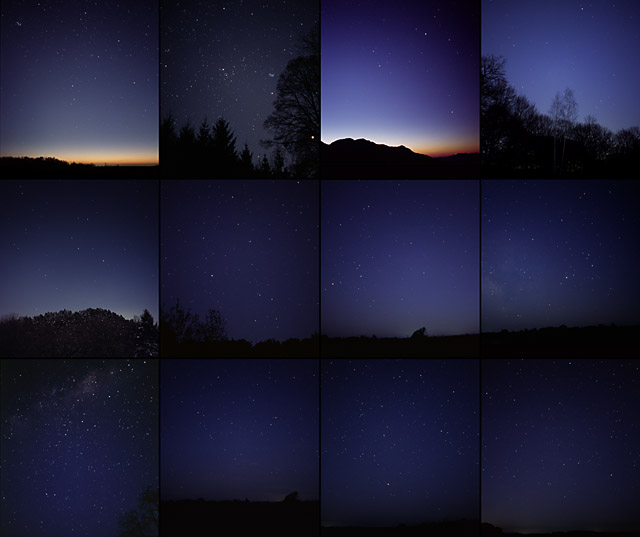The 12 Constellations
of the Zodiac

|
labels on/off
| ||||||||||||||||||
| Notes to the data |

|
| ||||||||||||||||||
| Notes to the data |
The Zodiac
During the course of one year, the earth orbits around the sun.
From the earth's point of view the sun appears to shift through a
background of many different constellations.
This apparent path of the sun is called ecliptic and the constellations
along this path define the circle of the zodiac. They are
(see labels):
Aries the ram, Taurus the bull, Gemini the twins, Cancer the crab,
Leo the lion, Virgo the virgin, Libra the scales, Scorpius the scorpion,
Sagittarius the archer, Capricornus the goat, Aquarius the water bearer,
and Pisces the fishes.
The division in twelve signs of the zodiac was probably already introduced
3000 years ago in Babylonia. Following the moons phases the year was divided
into twelve months. For each month an equal zone along the ecliptic was defined
as a sign of the zodiac to create the first known celestial coordinate
system and the predecessor of our modern calendar.
Astronomy-Astrology
Astronomy is the natural science of celestial objects whereas Astrology wants
to use celestial placements in order to explain the fate of individual
persons. No scientific evidence has ever been found to
support Astrologies claims. The signs of the zodiac were chosen arbitrarily
and in most cases there isn't even a similarity between the sign and the
star pattern in heaven. Interestingly todays astrology still uses the signs
in a way they were 3000 years ago. Because of a shift of earths axis
(precession) the historical signs of the zodiac do not correspond anymore
to the orginal star patterns (constellations). The sign of Sagittarius
(the archer) for example is mainly in todays constellation of Scorpius or
partly even in the constellation of
Ophiuchus which never was a sign of
the zodiac.
Natural Impression
The above constellation photos resemble more or less the impression of the
starry sky we have by naked eye. They are intended to be as natural as
possible, just the way the well adapted naked eye might see the stars in
a clear night at full darkness or at twilight.
There is no standard for the constellation
outlines, only the borders are defined by the International Astronomical Union.
So the outlines are quite arbitrary but similar to most sky charts. Their
purpose is just to help identifying the fixed star pattern of each celestial
region.
Nevertheless, it is always impressive to identify such a fixed star pattern
in the real night sky. Go, grab your sky chart and have a try! You even might
find some planets along the ecliptic (image).